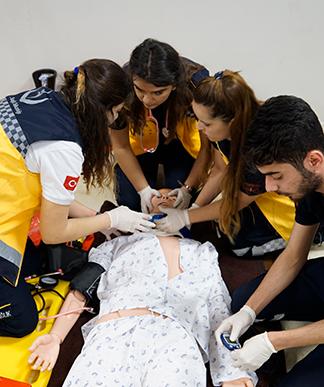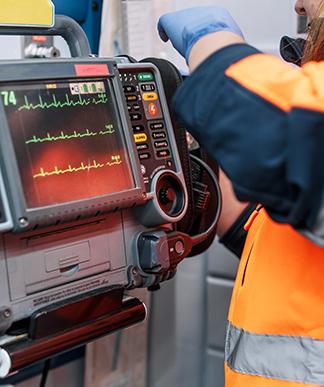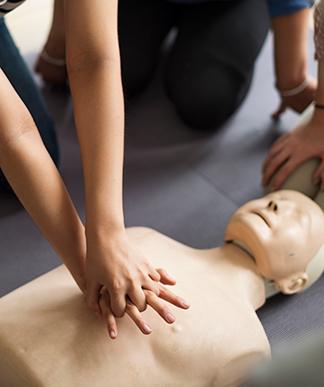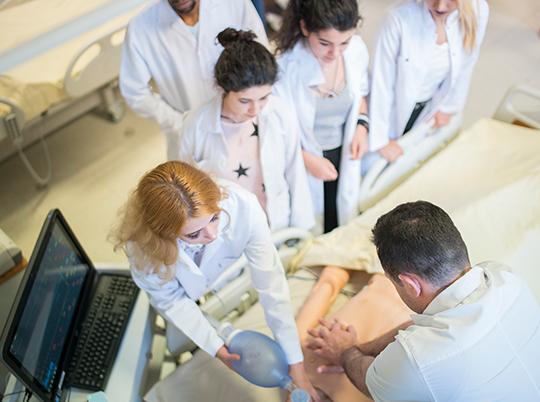


About the Program
First and Emergency Aid Technician training is 2 (two) years at associate degree level. The prospective students must fulfill the 233 criteria stated in the ÖSYM Registration and Reference Manual (being 1.65 m for male students, 1.60 m for female students in height; being no more than 5 kg or 15 kg less than the body height stated in weight; having the body and physical competence to work in a two-person team for rescue and transportation, carrying of the patient with the teammate). Education is provided in both theory and practice. Practical trainings are carried out in collaboration with the relevant units of the health institutions (112 Ambulance Stations and Emergency Services). In addition, everyone who graduated from the department must obtain a driver's license. Students graduating with the title of Health Technician by completing all of the occupational practices and internships in the program can work in pre-hospital emergency care services and other emergency services.
Education Opportunities
Cyprus International University have, so far, trained First and Emergency Aid Technicians who have an important place in Emergency Health Services; are able to do all types of medical interventions to the patient; are healthy and powerful; are able to make quick and accurate decisions; can use their hands and fingers skillfully; have strong sense of responsibility; establish good rapport with others. These are ensured through the use of state-of-the-art practice models and field instructors throughout their education.

Career Areas
Those who graduate from the program receive their associate degree diploma and take the title of "First and Emergency Aid Technician". Thus, they can work in emergency units of hospitals, 112 centers and stations, ambulance services. First and emergency aid technicians work in university and state hospitals, private health institutions' ambulance services and workplace emergency aid units. First and emergency aid technicians can also work as health personnel in emergency aid and patient transport ambulances, call-waiting staff in command control centers and health personnel in hospital emergency services. Those who successfully complete the associate degree program of the first and emergency aid, can make vertical transition to Emergency Aid and Disaster Management, Health Institutions Management or Nursing degree programs on the condition that they are successful in the Vertical Transfer Examination (DGS) organized by OSYM. They can also apply to distance education of the same departments without examination.
Contact
Vocational School of Health Sciences
Çevik Uraz Center, CU206
Tel: +90 392 671 1111 Extension: 2251
School E-mail: secretary-vhs@ciu.edu.tr
Director E-mail: aozada@ciu.edu.tr
Compulsory Courses
First Semester
BASIC ANATOMY
Course code
ANTM107Credit
2Theoretical
2Practical
0Ects
4READING AND WRITING SKILLS-I
Course code
ENGL141Credit
3Theoretical
2Practical
2Ects
4EMERGENCY PATIENT CARE-I
Course code
FAID105Credit
4Theoretical
3Practical
2Ects
4FREE ELECTIVE
Course code
FREEXX1Credit
2Theoretical
2Practical
0Ects
5INTRODUCTION TO COMPUTERS
Course code
ITEC110Credit
3Theoretical
3Practical
0Ects
4BASIC PHYSIOLOGY
Course code
PHYO101Credit
2Theoretical
2Practical
0Ects
4TURKISH LANGUAGE
Course code
TREG100Credit
0Theoretical
2Practical
0Ects
2TURKISH
Course code
TURK100Credit
0Theoretical
2Practical
0Ects
2UNIVERSITY ELECTIVE
Course code
UNIEXX1Credit
3Theoretical
3Practical
0Ects
4Second Semester
READING AND WRITING SKILLS-II
Course code
ENGL142Credit
3Theoretical
2Practical
2Ects
4TRAUMA
Course code
FAID102Credit
5Theoretical
3Practical
4Ects
7EMERGENCY PATIENT CARE-II
Course code
FAID106Credit
5Theoretical
2Practical
6Ects
6EMERGENCY MEDICAL SERVICES-I
Course code
FAID110Credit
3Theoretical
2Practical
2Ects
5AREA ELECTIVE
Course code
FAIDXX1Credit
2Theoretical
2Practical
0Ects
5HISTORY OF CIVILIZATION
Course code
HIST100Credit
0Theoretical
2Practical
0Ects
2MODERN TURKISH HISTORY
Course code
TARH100Credit
0Theoretical
2Practical
0Ects
2Third Semester
SUMMER TRAINING
Course code
FAID200Credit
0Theoretical
0Practical
0Ects
5EMERGENCY MEDICAL SERVICES-II
Course code
FAID203Credit
3Theoretical
2Practical
2Ects
5RESUSITATION
Course code
FAID205Credit
4Theoretical
2Practical
4Ects
4EMERGENCY PATIENT CARE-III
Course code
FAID207Credit
4Theoretical
3Practical
2Ects
5FREE ELECTIVE
Course code
FREEXX2Credit
2Theoretical
2Practical
0Ects
5PHARMACOLOGY
Course code
PHAR220Credit
2Theoretical
2Practical
0Ects
2UNIVERSITY ELECTIVE
Course code
UNIEXX2Credit
3Theoretical
3Practical
0Ects
4Fourth Semester
VOCATIONAL PRACTICE
Course code
FAID202Credit
10Theoretical
0Practical
20Ects
15AREA ELECTIVE
Course code
FAIDXX2Credit
2Theoretical
2Practical
0Ects
5AREA ELECTIVE
Course code
FAIDXX3Credit
2Theoretical
2Practical
0Ects
5FREE ELECTIVE
Course code
FREEXX3Credit
2Theoretical
2Practical
0Ects
5Elective Courses
TR Applicants
TR Students who are successful in the exams conducted by the Higher Education Council Student Selection and Placement Center (ÖSYM) and are entitled to enroll in our university in line with their preferences can complete the registration process with the necessary documents for registration from our Registration and Liaison Offices throughout Turkey or from the Marketing Directorate on campus.
Click for detailed admission requirements information.
TRNC Applicants
TRNC citizens and TR citizen candidate students who have completed their entire high school education in TRNC. They are placed in undergraduate programs in line with their success in the CIU Student Placement and Scholarship Ranking Exam and the programs they prefer.
Students who are successful in the exam can register from the TRNC Marketing Office.
You can directly apply online to our undergraduate programs using the application portal. Please fill in your details correctly and upload all the required documents listed on the last page of the application form.
Required documents;
- Completed application form,
- Higher/Secondary Certificate or equivalents (e.g. O/A’Level, WAEC/NECO),
- Evidence of English Language competence: TOEFL (65 IBT) or IELTS (5.5). Students without these documents will take the CIU English proficiency exam on campus following arrival,
- Scanned copy of international passport/birth certificate,
- Fully completed and signed CIU Rules and Regulations document (which can be downloaded during the online application).
Cyprus International University provides academic scholarships for its students as an incentive for success, with most students benefiting from 50%, 75% or 100% scholarships or discounted tuition fees. Click for more information.
Tuition Fees are determined at the beginning of each academic year. Candidate students who are entitled to enroll in CIU can learn their fees in line with the Tuition Fee Calculation system.